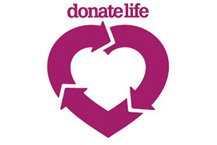Becoming an organ and tissue donor
Australia's transplant rates are some of the best in the world, although this cannot happen without donors and their families.
We know that 8 out of 10 families gave consent to donation when their family member was registered to be a donor. This dropped to only 4 out of ten families who gave consent to donation, when their family didn't know they wanted to be a donor.
Read more about why you should become a donor, the different types of donation, and how to register.
Why should I become an organ donor?
Organ and tissue donation can save and transform the lives of people who, in many cases, are seriously ill or dying.
While the majority of Australians support organ and tissue donation, only around 1 in 3 (36%) are registered to be a donor.
There are currently around 1,850 Australians on the waitlist for an organ transplant. There are also around 14,000 additional people on dialysis – some of whom may need a kidney transplant
Since the national program first began in 2009, more than 16,700 people have received life-saving organ transplants from 5,904 deceased organ donors.
Australia still needs people of all ages and backgrounds to become potential donors. Register and tell your family you want to be a donor – it only takes 1 minute
Join the register | DonateLife (external site).
What are the different types of donation?
There are 2 types of donation:
- Deceased Organ and Tissue Donation – when someone chooses to register on the Australian Organ Donor Register to become a potential organ or tissue donor after their death.
- Living Organ Donation – when someone donates a kidney or part of their liver to another person while they are still alive. For further information visit – Understanding living donation | DonateLife (external site).
- Living Tissue Donation – People may be able to donate their bone tissue if they are undergoing joint replacement surgery. Plus Life (Perth Bone and Tissue Bank) manage this process. For further information, call (08) 6144 3500, email Plus Life or visit the Plus Life website (external site).
Who can become a donor?
Almost everyone can become an organ and tissue donor.
The governing factors are where and how a donor dies (if a deceased donor) and the condition of their organs and tissues.
Living donors who choose to donate a kidney or part of their liver are generally family members or close friends of the recipient. The operation will only proceed if strict medical and legal criteria have been met.
While your age and medical history will be considered, you shouldn't assume you are too young, too old, or not healthy enough to become a donor.
Only 1-2 per cent of people who die in hospital can become organ donors, which is why Australians of all ages and backgrounds are encouraged to become potential donors.
How can I become a donor?
If you are 16 years of age, or older and want to become a donor after death, you can register at Join the register | DonateLife (external site)
Until 2004, Western Australians were able to register their wish to be an organ and tissue donor on their driver’s licence. However, registration is now only possible through the Australian Organ Donor Register (AODR).
You can also join the AODR on the following channels, where you can specify which organs and/or tissues you are willing to donate.
To find out if you are still registered, complete the online form at Join the register | DonateLife (external site) or Australian Organ Donor Register form (NH007DF) - Services Australisa (external site). If you are having any difficulty, please email aodr@servicesaustralia.gov.au or call the AODR directly on 1800 777 203, TTY 1800 810 586 (hearing and speech impaired) , TIS 131 450 (Translating and Interpreting Service)
If you choose to register, remember to tell your family. After your death, your family will make the final decision about whether to donate your organs or tissues.
If you are a family member or close friend of someone needing a transplant and are interested in donating a kidney or part of your liver, speak to your health professional. For further information visit the DonateLife (external site).
The AKX Programme (external site) – Australian Kidney Exchange programme helps patients seeking a kidney transplant, whose potential living donor is unsuitable for them due to blood group and/or tissue incompatibility.
Who manages organ and tissue donations after death in Western Australia
DonateLife Western Australia (external site is part of WA Health (North Metropolitan Health Service). It coordinates all organ and tissue donor activities across Western Australia.
DonateLife WA works with hospitals and hospital-based DonateLife medical and nursing specialists to provide professional donation services and encourage best practice to increase donation rates.
DonateLife WA aims to raise awareness about organ and tissue donation, encourage discussion about donation, offer compassionate support to donor families and manage effective services in organ and tissue donation.
More information
For further queries or to organise a presentation on the subject at your workplace, sporting, or social club, contact DonateLife WA by email or call 1800 950 955
Remember
Information provided by

This publication is provided for education and information purposes only. It is not a substitute for professional medical care. Information about a therapy, service, product or treatment does not imply endorsement and is not intended to replace advice from your healthcare professional. Readers should note that over time currency and completeness of the information may change. All users should seek advice from a qualified healthcare professional for a diagnosis and answers to their medical questions.